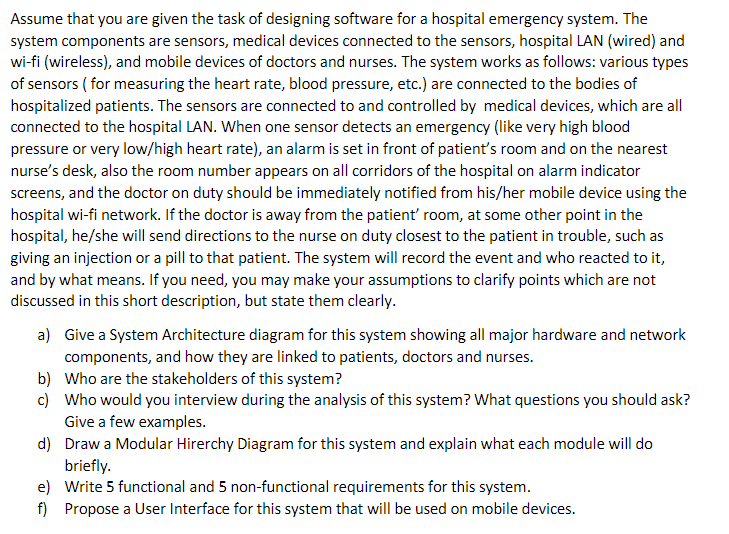
Assume that you are given the task of designing software for a hospital emergency system. The system components are sensors, medical devices connected to the sensors, hospital LAN (Wired) and wi-fi (wireless), and mobile devices of doctors and nurses. The system works as follows: various types of sensors (for measuring the heart rate, blood pressure, etc.) are connected to the bodies of hospitalized patients. The sensors are connected to and controlled by medical devices, which are all connected to the hospital LAN. When one sensor detects an emergency (like very high blood pressure or very low/high heart rate), an alarm is set in front of patient's room and on the nearest nurse's desk, also the room number appears on all corridors of the hospital on alarm indicator screens, and the doctor on duty should be immediately notified from his/her mobile device using the hospital wi-fi network. If the doctor is away from the patient' room, at some other point in the hospital, he/she will send directions to the nurse on duty closest to the patient in trouble, such as giving an injection or a pill to that patient. The system will record the event and who reacted to it, and by what means. If you need, you may make your assumptions to clarify points which are not discussed in this short description, but state them clearly. a) Give a System Architecture diagram for this system showing all major hardware and network components, and how they are linked to patients, doctors and nurses. b) Who are the stakeholders of this system? c) Who would you interview during the analysis of this system? What questions you should ask? Give a few examples. d) Draw a Modular Hirerchy Diagram for this system and explain what each module will do briefly. e) Write 5 functional and 5 non-functional requirements for this system. f) Propose a User Interface for this system that will be used on mobile devices. Assume that you are given the task of designing software for a hospital emergency system. The system components are sensors, medical devices connected to the sensors, hospital LAN (Wired) and wi-fi (wireless), and mobile devices of doctors and nurses. The system works as follows: various types of sensors (for measuring the heart rate, blood pressure, etc.) are connected to the bodies of hospitalized patients. The sensors are connected to and controlled by medical devices, which are all connected to the hospital LAN. When one sensor detects an emergency (like very high blood pressure or very low/high heart rate), an alarm is set in front of patient's room and on the nearest nurse's desk, also the room number appears on all corridors of the hospital on alarm indicator screens, and the doctor on duty should be immediately notified from his/her mobile device using the hospital wi-fi network. If the doctor is away from the patient' room, at some other point in the hospital, he/she will send directions to the nurse on duty closest to the patient in trouble, such as giving an injection or a pill to that patient. The system will record the event and who reacted to it, and by what means. If you need, you may make your assumptions to clarify points which are not discussed in this short description, but state them clearly. a) Give a System Architecture diagram for this system showing all major hardware and network components, and how they are linked to patients, doctors and nurses. b) Who are the stakeholders of this system? c) Who would you interview during the analysis of this system? What questions you should ask? Give a few examples. d) Draw a Modular Hirerchy Diagram for this system and explain what each module will do briefly. e) Write 5 functional and 5 non-functional requirements for this system. f) Propose a User Interface for this system that will be used on mobile devices







